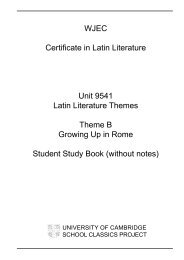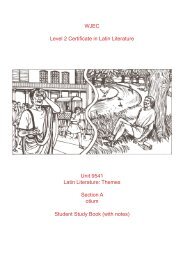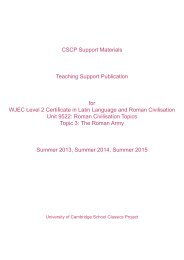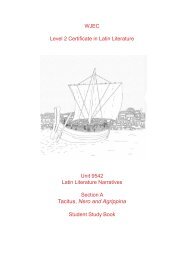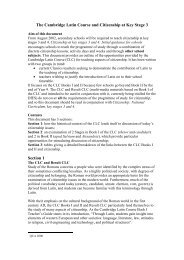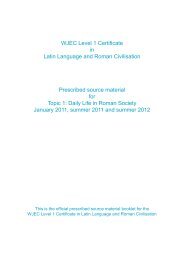2. Student Study Book - Cambridge School Classics Project
2. Student Study Book - Cambridge School Classics Project
2. Student Study Book - Cambridge School Classics Project
You also want an ePaper? Increase the reach of your titles
YUMPU automatically turns print PDFs into web optimized ePapers that Google loves.
18. According to Catullus in line 3, what shone? For whom? (Or “on whom?”) Remember who Catullus is speakingto (see line 1).19. Why is soles plural? (If puzzled, look back at line 4 of the previous poem.)20. In line 3, is Catullus reporting on the weather? If not, what does line 3 mean?21. What was Catullus in the habit of doing (line 4)? Where? What is the case of puella?22* Does line 4 simply mean that the same person (which one?) always arranged where the lovers were to meet(which might not be an easy thing to arrange if the puella was a married woman)? Or does it mean that it wasalways the same person who made the decisions and the other one always agreed? (There is no official “rightanswer” to this.)23. Find and translate a perfect passive participle in line 5, describing puella.24. Although Catullus is talking to himself, using 2nd-person verb-endings, he refers to himself in line 5 by a 1stpersonpronoun. He does not use ego or mihi, etc., but uses a 1st -person plural pronoun (unusual in Englishexcept when used by royalty, e.g. Queen Victoria: “We are not amused”). Find and translate the pronoun, whichis dative, but is best translated as by ….25. How greatly, according to the last three words of line 5, was the girl loved by Catullus? If puzzled by the endingof amabitur, see the <strong>Cambridge</strong> Latin Grammar, page 30, 1st-conjugation.26. … amabitur can be interpreted as … ever loved by Catullus or as … ever loved by anybody. Or the translationcan end at will ever be loved, so that both interpretations are possible, which may be what Catullus intended.27. Translate lines 1-5.Answers10. (i) You should regard the money which the thief stole as gone for good.(ii) (b) You see that the dog has died.(iii) You should regard the dog which you see has died as gone for good.38 WJEC Level 2 Latin Literature Unit 9541 Love and Marriage





